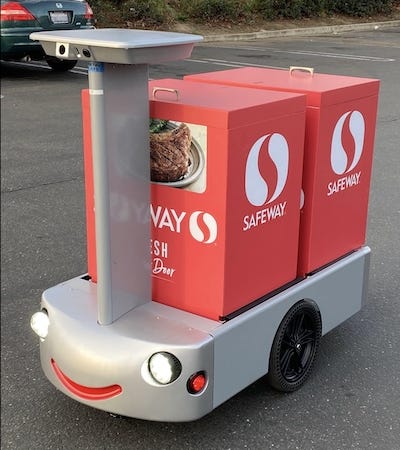Albertsons Cos.’ Safeway tests automated grocery delivery cartAlbertsons Cos.’ Safeway tests automated grocery delivery cart
Remote-controlled vehicle from Tortoise brings online orders to customers’ homes
March 5, 2021

Albertsons Cos. supermarket chain Safeway is piloting a remote-controlled grocery delivery cart in Northern California with automated logistics specialist Tortoise.
Albertsons said Friday that the Tortoise cart provides a contactless solution for last-mile delivery of online grocery orders. Equipped with a camera and a speaker, the electric-powered cart is guided through the neighborhood by a remote operator. Customers receive a text message to come outside and pick up their groceries when the cart arrives at their home.
Currently, the service is open for testing with Safeway associates in selected Northern California neighborhoods, Boise, Idaho-based Albertsons said. In these early stages, a friendly escort will accompany the cart as part of the pilot process.
“Our team is obsessed with trying new and disruptive technologies that can bring more convenience for our customers,” Chris Rupp, executive vice president and chief customer and digital officer at Albertsons Cos., said in a statement. “We are willing to quickly test, learn and implement winning innovations that ensure we are offering the easiest and most convenient shopping experience in the entire industry.”
The cart from Mountain View, Calif.-based Tortoise can carry up to 120 pounds of groceries — including ambient, chilled and frozen items — in four lockable containers and deliver to homes within three miles of a store.
Delivery works as follows: The store loads the cart and texts the delivery address and cart number to Tortoise, which remotely controls the vehicle from its facility in Mexico City. Once under way, the cart travels on a sidewalk or the side of the road. Upon arrival at the customer’s address, the cart is unlocked by the remote operator, at which time Tortoise notifies the store that the delivery has been completed and sends the cart back for the next order.

The Tortoise cart holds up to 120 pounds of groceries — including ambient, chilled and frozen items — in lockable containers and delivers to homes within three miles of a store.
Albertsons is piloting the second-generation Tortoise cart, which has a flat cargo bed. The original “pickup truck” model has a deeper cargo bed, with raised sides and rear, that can hold 150 pounds of groceries and other parcels. Fully powered by an electric battery, the zero-emissions cart travels at an average speed of 3 mph (with a maximum speed of 7 mph) and can bear the retailer’s brand, as can the containers.
On its website, Tortoise said its cart can provide a 50% to 75% cost savings versus delivery by human drivers. That translates to a $6 to $11 savings per delivery, based on a two-mile or less cost per delivery of $4 for the Tortoise cart and $10 to $15 for a human driver.
Tortoise’s advisory board includes James McCann, a former CEO of Tesco, Carrefour and Ahold USA and now chairman and CEO at Food Retail Ventures, a venture capital firm based in San Francisco.
“An interesting fact is that over 45% of deliveries are made to customers that live within three miles of the grocery store that fulfilled their order. The number is slightly higher for customers that receive a delivery from a convenience store. Does it really make sense to use a car, van or truck to make deliveries to customers living within three miles of a store? No,” Brittain Ladd, a thought leader and consultant in food retail supply chain, logistics and e-commerce, wrote in a blog post in September. “The alternative is Tortoise Cart.”
Albertsons noted that the Tortoise cart reflects its efforts to use new technologies to provide more online grocery fulfillment options. In January, the supermarket giant announced a pilot of an automated, temperature-controlled grocery pickup kiosk outside a Jewel-Osco store in Chicago. At the time, Albertsons said the PickUp Kiosk, developed by Estonia-based Cleveron, also was earmarked for testing at a Safeway store in the San Francisco Bay Area. The freestanding unit can be located inside or outside the store.
And last fall, Albertsons unveiled a pilot of online grocery pickup lockers at selected Jewel-Osco and Safeway supermarkets. The service, branded as PickUp, uses Bell and Howell modular, temperature-controlled lockers that can be placed indoors or outdoors. Customers enter a code at the self-serve lockers to retrieve their groceries.
Other grocery retailers testing autonomous vehicles for last-mile delivery include Walmart, Kroger, Save Mart, H-E-B and Amazon. Ahold Delhaize USA’s Stop & Shop also is piloting “self-driving grocery stores” with Robomart driverless vehicles that bring consumers a selection of groceries when summoned via an app. In addition, Walmart, Target and Walgreens are among a group of retailers working with FedEx Corp. to test a robot — dubbed the FedEx SameDay Bot — for last-mile delivery of online orders.
Walmart and Canadian grocer Loblaw also are piloting autonomous vehicles for middle-mile delivery in partnership with Gatik. The self-driving trucks bring online grocery orders from picking facilities to stores.
About the Author
You May Also Like





.webp?width=300&auto=webp&quality=80&disable=upscale)
